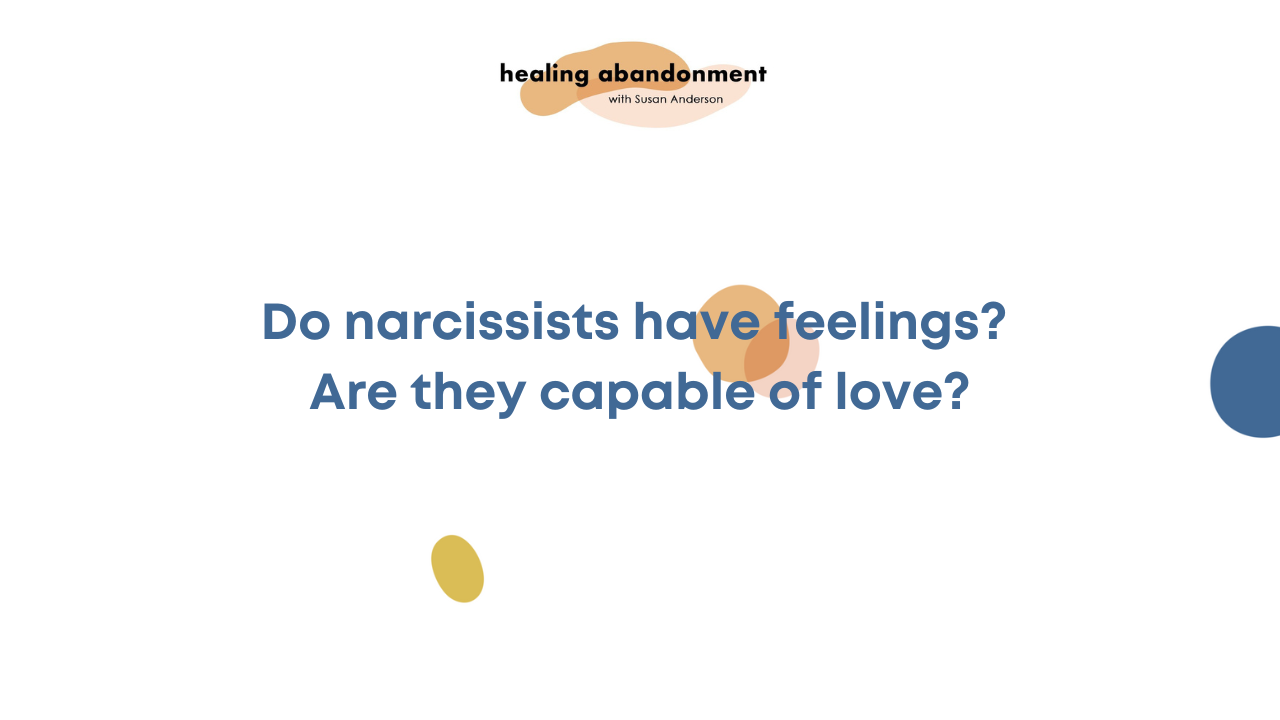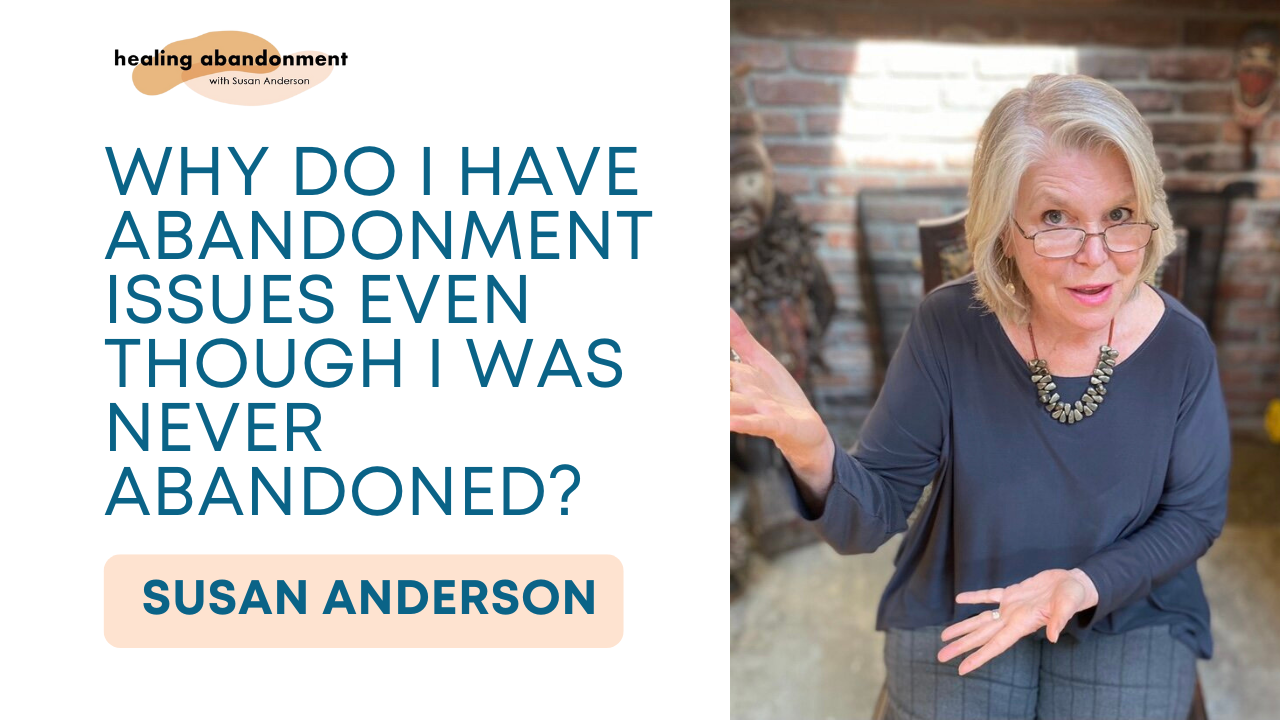Abandonment Recovery Videos
By Susan Anderson
From understanding abandonment syndrome to exploring the link between abandonment and narcissism, Susan Anderson’s bite-sized videos deliver expert guidance in minutes. Perfect for quick insights or as part of your daily recovery practice, these videos introduce core concepts and actionable tips for healing. For a deeper understanding, watch the full versions anytime on YouTube.
To experience the Abandonment Recovery Program, buy Susan’s books, sign-up for her workshops or purchase the Program.
May this be the beginning of your healing journey.
How can you handle a narcissist?
Dealing with a narcissist can be emotionally draining, but it’s possible to navigate the challenges while protecting your well-being. In this video, Susan Anderson shares practical strategies for managing interactions with narcissists, setting boundaries, and preserving your emotional health. Learn how to recognize their tactics, maintain your confidence, and prioritize self-care in difficult situations.
What happens when you’re raised by a narcissist?
Growing up with a narcissistic parent can leave lasting emotional imprints. In this video, Susan Anderson explores the unique challenges children face in such an environment. Learn how these experiences can shape a child's emotional patterns and relationships into adulthood—and how healing and recovery are possible.
Why does someone we love suddenly become narcissistic?
It can be deeply confusing and painful when someone you love starts displaying narcissistic behaviors seemingly out of nowhere. In this video, Susan Anderson unpacks the reasons behind this shift.
Here’s why people with abandonment issues tend to be attracted to narcs
In this video, Susan Anderson explores why people struggling with feelings of insecurity and rejection are drawn to narcissists, whose charm and confidence can feel captivating at first but often lead to cycles of emotional pain.
Always attracted to the unavailable? You could be an abandoholic. Susan’s akēru exercise 4—Overcoming Outer Child's Self-Defeating Patterns—can help.
How do narcissists induce abandonment feelings?
Narcissists have a way of creating emotional confusion, leaving others feeling neglected, invalidated, or even abandoned. In this video, Susan Anderson explores the tactics narcissists use that trigger deep feelings of abandonment. Gain insights into why this happens, how it affects your self-esteem, and what you can do to protect yourself and begin healing.
Do narcissists have feelings?
In this video, Susan Anderson explores the question: Are narcissists capable of love? Can they truly care for others, or is their love conditional and self-serving? Whether you're dealing with a narcissist in your life or simply want to better understand human behavior, this video will provide insightful answers.
Never abandoned but with abandonment issues
Ever felt terrified of being left alone, even though you've never actually been abandoned? You're not alone! Many people struggle with abandonment issues and abandonment trauma without experiencing overt abandonment in childhood. In this video, Susan Anderson shares the surprising reason why you might be experiencing these feelings.
Signs of abandonment issues in adults (abandonment pain in a nutshell)
Have you ever felt deeply hurt or rejected by someone you love? Do you find yourself constantly seeking approval or fear being alone? You might be dealing with an abandonment wound. Susan Anderson shares her insights on the common symptoms of abandonment wounds.
Check out Susan’s books where she discusses the abandonment wound in depth.
What happens when you are raised by a narcissist?
Growing up with a narcissistic parent can leave lasting emotional imprints. In this video, Susan Anderson explores the unique challenges children face in such an environment. Learn how these experiences can shape a child's emotional patterns and relationships into adulthood—and how healing and recovery are possible.
Dealing with a narcissist? Here’s how you take care of yourself
Dealing with a narcissist can be emotionally draining, but it’s possible to navigate the challenges while protecting your well-being. In this video, Susan Anderson shares practical strategies for managing interactions with narcissists, setting boundaries, and preserving your emotional health.
Having trouble loving yourself? Susan’s akēru exercise 3 provides Instructions for healing deep primal wounds and inculcating self-love for real.
What is a narcissistic injury?
Narcissistic injuries aren’t just limited to narcissists—they can affect anyone who has a fragile sense of self or struggles with deep insecurity. In this video, Susan Anderson explains what constitutes a narcissistic injury for non-narcissistic individuals, including how small criticisms or perceived slights can trigger feelings of shame, humiliation, or rejection.
Can narcissists have real relationships?
In this video, Susan Anderson delves into whether narcissists are capable of developing real, lasting relationships, and what it takes for them to change. Learn about the challenges they face in building empathy, intimacy, and trust, and how their relationships tend to play out.
Is lovebombing (and breadcrumbing) a sign of narcissism?
Love bombing and breadcrumbing are often associated with narcissistic behavior, but is this always the case? In this video, Susan Anderson explains whether these tactics are clear signs of narcissism or if they can occur in other types of relationships.
Can narcissism be situational?
Can narcissistic behavior appear in certain situations without being a permanent personality trait? In this video, Susan Anderson explores the concept of situational narcissism—how stress, power dynamics, or specific circumstances can trigger narcissistic traits even in people who don’t typically exhibit them.
What happens when someone with abandonment issues gets involved with a narcissist?
When you have abandonment issues and interact with a narcissist, the emotional turmoil can be overwhelming. In this video, Susan Anderson explains the psychological effects of this dynamic, where a narcissist’s behavior can trigger deep feelings of rejection and insecurity.
Narcissism vs Narcissistic Personality Disorder: What’s the Difference?
Not all narcissistic behavior qualifies as Narcissistic Personality Disorder (NPD). In this video, Susan Anderson breaks down the key differences between someone displaying narcissistic traits and a clinical diagnosis of NPD.
Calling someone a “narcissist”. What’s that about?
Accusations of narcissism are becoming increasingly common, but what drives people to label others this way? In this video, Susan Anderson explores the reasons behind these accusations.
Narcissism vs Narcissistic Personality Disorder: What’s the Difference?
Not all narcissistic behavior qualifies as Narcissistic Personality Disorder (NPD). In this video, Susan Anderson breaks down the key differences between someone displaying narcissistic traits and a clinical diagnosis of NPD.
Can narcissists form attachments to other people?
Narcissists often form complex and confusing bonds with the people in their lives, but is true attachment part of the equation? In this video, Susan Anderson examines whether narcissists are capable of forming genuine emotional attachments to others.
Can narcissists care about others?
Narcissists can sometimes display behaviors that seem thoughtful and compassionate, but are these actions genuine? In this video, Susan Anderson explores whether narcissists are truly capable of caring for others or if their seemingly kind gestures are driven by self-interest, manipulation, or the need for validation.
How does narcissism affect relationships?
Narcissism can deeply affect the dynamics of any relationship, often leading to emotional imbalance and pain. In this video, Susan Anderson explores how narcissistic behaviors disrupt trust and intimacy.
How does narcissism develop and how is it different from normal development?
What causes narcissism, and how does it differ from healthy emotional growth? In this video, Susan Anderson dives into the roots of narcissism and how these patterns deviate from normal development, impacting self-perception and relationships.


